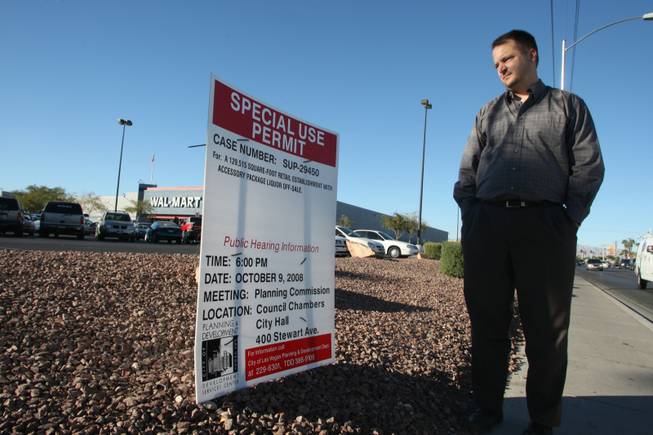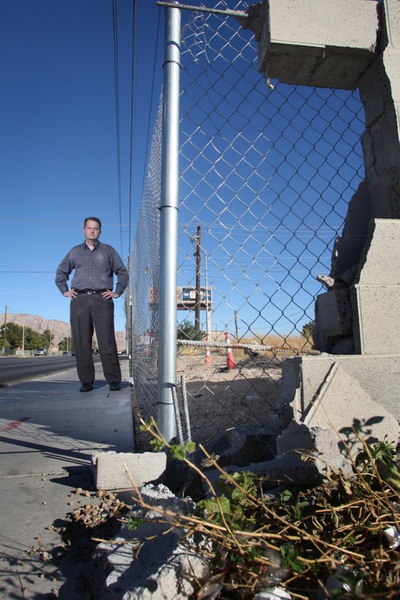
Martin Dean Dupalo looks at the posting for the special use permit that would have allowed Wal-Mart on Nellis Boulevard to sell alcohol.
Monday, Nov. 10, 2008 | 2 a.m.
In Martin Dean Dupalo’s neighborhood, finding a place to buy alcohol has always been easy — astoundingly easy.
More than 80 such outlets lie within a 1.5-mile radius of the corner of Stewart Avenue and Nellis Boulevard.
Bars and restaurants. Liquor stores and groceries. Mini-marts and bodegas.
Dupalo decided he’d had enough of the liquor-fueled behavior and the drunken driving he said was surely a direct result of the availability of alcohol.
So he decided to take on his local Wal-Mart, at 201 N. Nellis Blvd., which had planned to add package liquor sales. The giant low-priced retailer first needed the approval of the Las Vegas Planning Commission and the City Council.
Dupalo, a UNLV political science instructor, lobbied City Hall with an inventive campaign. His quest ended Wednesday when the council unanimously — and surprisingly — rejected Wal-Mart’s liquor license bid.
“I did not think I would win,” Dupalo said. “But I had a strong, proper, aboveboard cause that I felt I had to pursue.”
Dupalo is no stranger to the workings of government. In addition to teaching and studying politics — he’s pursuing a doctorate — he has been an activist in his neighborhood over the past decade on issues such as speed bumps.
Moreover, Dupalo, a former Air Force intelligence officer, has since 2002 been a member of the city’s Community Development Review Board, which evaluates funding requests from nonprofit groups.
He’s been recognized as Citizen of the Month by the city for his community volunteer efforts.
Dupalo knew he was in for a battle from the start, but he believed his argument was sound.
He sent the Planning Commission a four-page letter before its Oct. 9 meeting, urging the panel to consider the social effects of the “over-saturation” of liquor outlets in the neighborhood.
The position of Wal-Mart’s attorneys was clear:
“The liquor Wal-Mart intends to sell is commonly available for purchase, and patrons will benefit from the option of a competing location that sells packaged liquor at competitive prices,” locally retained Wal-Mart attorney Lucas Tucker wrote to the Planning Commission on Aug. 12.
A spokesman at Wal-Mart headquarters in Bentonville, Ark., recently elaborated.
“Ultimately, it’s about what the customers want,” said Dan Fogleman, who noted that they appreciate one-stop shopping. Stores across the country, he said, “constantly” get requests to add beer and wine to their inventories.
Dupalo couldn’t attend the Planning Commission meeting, but asked that his letter be read into the record. It wasn’t, he said, and the commission, after a brief presentation by Wal-Mart’s local attorney, passed the proposal unanimously.
Then it was up to the council.
Dupalo has known Ward 3 Councilman Gary Reese for about a decade, he said. Reese appointed him to the Review Board.
But initially, Dupalo said, he encountered resistance to his opposition to Wal-Mart from everyone he spoke with on City Hall’s 10th floor.
“I was repeatedly told that Wal-Mart is powerful” and not worth opposing, Dupalo said.
He didn’t have scores of names on a petition or dozens of neighbors set to testify before the council. Nor did he have local drunken driving statistics, though Metro Police back his argument.
Metro spokesman Bill Cassell said Dupalo’s neighborhood is regularly a spot for DUI saturation patrols and checkpoints because of its relatively high drunken driving rate.
Without detailed statistics or strong shows of neighborhood resistance, Dupalo came up with another compelling way to make his case: photographs.
During a trip around his neighborhood, Dupalo took pictures of 34 sites where DUIs had occurred. The photos showed damaged fences, walls, utility poles and mailboxes. He said that in almost every case, he had been told by property owners and others that the damage had been caused by drunken drivers.Dupalo also researched where liquor is sold in the area and found 85 locations.
He included the photos and list in a thick packet he delivered to council members and their top staffers. He also lobbied two of them directly — Councilwoman Lois Tarkanian and Reese, in whose ward the Wal-Mart resides.
At Wednesday’s council meeting, Dupalo and two neighbors spoke against the plan. Dupalo pointed to the pictures, saying they were “the scars of my neighborhood.”
Reese seemed convinced. He talked about the integrity of Dupalo’s neighborhood. “I can see that that has been questioned, and I don’t like that,” he said.
Reese wondered why a store such as Wal-Mart needed to sell alcohol.
“What’s next,” he said, “Kmart?”
Wal-Mart attorney Paul Larsen, sensing a possible defeat, offered to withdraw the proposal if the company could retain the option of introducing it again at any time.
Reese demurred.
The council then voted.
After the meeting, Larsen said he didn’t know what caused the sudden backlash to Wal-Mart’s plan — especially because the day before, Reese had promised him his support.
Reese denied making such a promise or even talking to Larsen before the meeting.
None of that matters to Dupalo. He said he’s on to his next fight. A Liborio Market, which specializes in Hispanic foods, is opening in the neighborhood.
It wants to sell liquor.
He’s going to do what he can to prevent that.


Join the Discussion:
Check this out for a full explanation of our conversion to the LiveFyre commenting system and instructions on how to sign up for an account.
Full comments policy